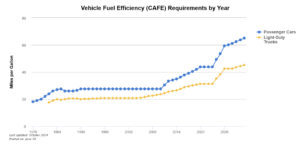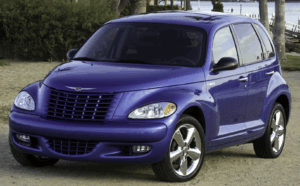Fueling The Conversation, Week of October 27th, 2025
Seeking to reduce American dependence on foreign oil after the Arab oil embargo of 1973, Congress passed the Energy Policy and Conservation Act. Included in the act was the Corporate Average Fuel Economy (CAFE) program, which required automakers to meet a fleet-wide fuel economy average for cars and light trucks.
The automobile industry opposed the program, citing concerns over costs, consumer choice, market distortion, and safety. Despite consumer preference at the time for bigger and faster cars, manufacturers complied by rebalancing their production lines, selling smaller and lighter vehicles, improving aerodynamics, and trading horsepower for efficiency.
There is little doubt the program had an impact. Between 1975 and 1985, passenger vehicle mileage doubled from around 13.5 to 27.5 miles per gallon, while light trucks increased from 11.6 to 19.5 miles per gallon. Following an initial surge, the requirements remained relatively stagnant for decades, mainly due to lower gas prices and shifting political priorities.

Some changes were made to the program, however. Electric vehicles were not originally included in the CAFE program. In 1979, Congress gave EVs a “petroleum equivalency factor” to “convert the measured electrical energy consumption of an EV into a gasoline-equivalent fuel economy,” thus allowing automakers to incorporate EVs into their fleet-wide calculations. During the Clinton administration, EVs were assigned a fuel economy multiplier of 6.67, further increasing their value in meeting CAFE standards. Including EVs in CAFE standards provided an incentive for automakers to produce more of them, but it also gave them some leeway to continue producing less-fuel-efficient cars and trucks.
The “footprint” rule, implemented in 2006, set fuel economy targets based on a vehicle’s footprint (wheelbase × track width). This change is credited with driving the SUV and truck market, but it effectively lowered fleet-wide fuel economy by one to four miles per gallon.
In 2007, in response to another wave of high energy prices, President George W. Bush signed the Energy Independence and Security Act, making major changes to the CAFE program. The law set a new goal for a combined fleet average of 35 miles per gallon by model year 2020, applied CAFE to light trucks and SUVs, closed loopholes, and extended requirements to medium- and heavy-duty trucks. It also established the system for earning and trading credits for exceeding standards (which helped allow Tesla to rack up billions in profits by selling regulatory credits).
In 2009, on the heels of the bailouts of GM and Chrysler, President Obama hijacked the CAFE program, creating a new national program for “fuel efficiency and climate change,” and requiring 35.5 miles per gallon by 2016. In 2011, the Obama administration doubled down, ratcheting the requirement to an impossible 54.5 miles per gallon by 2025. Given that the average fuel economy in 2024 for cars and light trucks was 24 and 18 miles per gallon, respectively, Obama’s standards turned CAFE into a de facto EV mandate. Incidentally, you can also thank the 2009 standards for the ridiculous stop/start technology found in most new vehicles today.
In his first term, President Trump attempted to put the brakes on President Obama’s efforts. Four years later, President Biden quickly reversed course, turbocharging the Obama program. The Biden administration mandated an increase of fuel economy standards by 2% each year for new cars from 2027 to 2032 and new passenger trucks from 2029 to 2031. They also raised the fuel efficiency standards for new heavy-duty pickup trucks and vans by 10% each year from 2030 to 2032 and by 8% each year from 2033 to 2035. By combining these exorbitant fuel economy mandates with generous taxpayer-funded subsidies for EVs and EV technology, the Biden administration would have effectively forced automakers to fully electrify more than half of all vehicles sold in the U.S. by 2032.
In his campaign for reelection, President Trump promised to end the Obama/Biden EV mandate. So far, he and the Republicans in Congress are delivering on that promise. Moves by the administration and Congress to fix the CAFE program, reverse the endangerment finding, and revoke the California waiver, along with resetting the maximum civil penalty for CAFE noncompliance to zero, eliminating EV tax credits for both new and used vehicles, and rescinding funding for the financing of battery manufacturing in the One Big Beautiful Bill Act, are significant steps in the right direction.
But history shows that changes in regulations and provisions passed in reconciliation measures are fleeting. As long as the government has the authority to mandate fuel efficiency, the ability of future administrations to disrupt auto markets, in both small ways (remember the PT Cruiser?) and destructive ways, will persist.

The CAFE mandate was supposed to help mitigate oil supply shocks. This, of course, has become unnecessary due to the 149% increase in domestic oil production since 2005. Setting this aside, fuel efficiency is certainly an important attribute for consumers when deciding to purchase a new vehicle. But it is not the end-all be-all. Considering that the average fuel efficiency for a light-duty vehicle is roughly the same as it was in 1985, it begs the question as to whether the CAFE program was even necessary in the first place. Market forces, guided by fuel prices, consumer preferences, and competitive innovation, would have been at least as successful and certainly less intrusive.
The CAFE program was never intended to force such dramatic changes to the automobile market as those envisioned by Presidents Obama and Biden. In fact, the statute specifically required that any increases in fuel efficiency be both technologically feasible and economically practical. Like many government programs, however, CAFE was hijacked by a political agenda.
The auto industry can shoulder considerable blame for its current predicament. Their willingness to go along with the push to an all-electric future only served to embolden the Biden administration to exert even more control over the assembly line. President Trump and the Republicans in Congress must push to completely eliminate fuel economy standards once and for all. It’s time to repeal CAFE and let the market determine the future of the automobile industry.
__________________
Fueling the Conversation, a weekly column by IER President Tom Pyle, offers a principled take on energy events. Energy underpins all aspects of modern life, so policies that artificially limit production hurt everyday people paying to heat their homes and drive to work. “Green” groups push these policies for ideological reasons, but this column uses economic logic and hard facts to advocate for energy freedom.



